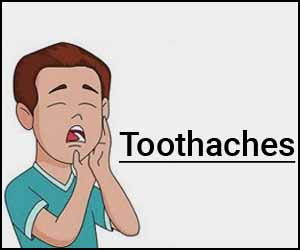- Home
- Editorial
- News
- Practice Guidelines
- Anesthesiology Guidelines
- Cancer Guidelines
- Cardiac Sciences Guidelines
- Critical Care Guidelines
- Dentistry Guidelines
- Dermatology Guidelines
- Diabetes and Endo Guidelines
- Diagnostics Guidelines
- ENT Guidelines
- Featured Practice Guidelines
- Gastroenterology Guidelines
- Geriatrics Guidelines
- Medicine Guidelines
- Nephrology Guidelines
- Neurosciences Guidelines
- Obs and Gynae Guidelines
- Ophthalmology Guidelines
- Orthopaedics Guidelines
- Paediatrics Guidelines
- Psychiatry Guidelines
- Pulmonology Guidelines
- Radiology Guidelines
- Surgery Guidelines
- Urology Guidelines
Antibiotics not necessary for toothaches in most cases, recommends ADA guideline

Patients with toothaches are often prescribed antibiotics by physicians and dentists to help relieve signs and symptoms and prevent progression to a more serious condition. In most cases, antibiotics not necessary for toothaches recommends new ADA guideline.
The American Dental Association (ADA) has released a new Clinical Practice Guideline (2019) on antibiotics Use for the Urgent Management of Dental Pain and Intra-oral Swelling. It is a step forward towards the ADA's pledged commitment to the U.S. government's Antimicrobial Resistance Challenge. The guidance has been published in the November issue of the Journal of the American Dental Association.
The new guideline and accompanying systematic review found that healthy adults experiencing a toothache are best served not by antibiotics but by dental treatment and, if needed, over-the-counter pain relievers such as acetaminophen and ibuprofen.
"Antibiotics are, of course, tremendously important medications," said Peter Lockhart, D.D.S., chair of the ADA expert panel that developed the guideline and research professor at Carolinas Medical Center - Atrium Health. "However, it's vital that we use them wisely so that they continue to be effective when absolutely needed."
Studies have shown that antibiotics, which are designed to stop or slow the growth of bacterial infections, don't necessarily help patients experiencing a toothache. In addition, antibiotics can cause serious side effects, and overuse has resulted in bacterial strains that are resistant to antibiotics.
The guideline offers example scenarios when antibiotics may be prescribed for a toothache. "When dental treatment is not immediately available and the patient has signs and symptoms such as fever, swollen lymph nodes, or extreme tiredness, antibiotics may need to be prescribed," said Dr. Lockhart. "But in most cases when adults have a toothache and access to dental treatment, antibiotics may actually do more harm than good."

Disclaimer: This site is primarily intended for healthcare professionals. Any content/information on this website does not replace the advice of medical and/or health professionals and should not be construed as medical/diagnostic advice/endorsement or prescription. Use of this site is subject to our terms of use, privacy policy, advertisement policy. © 2020 Minerva Medical Treatment Pvt Ltd